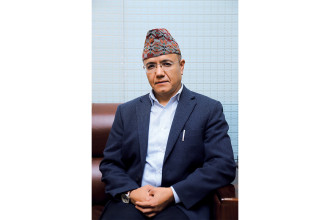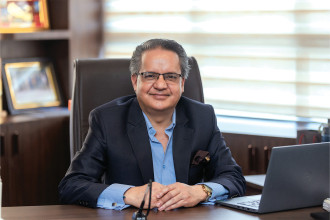
A leading and well respected chartered accountant by profession, Jitendra B. Rajbhandary has been contributing to the audit of major financial institutions, government institutions, hydropower project, hotels and tourism related industries among others. He has also been involved as a bilateral auditor of multiple embassies, INGOs and NGOs, conducted Assessment of Financial Intermediaries (Class A Commercial Banks) for Kabeli A Hydroelectric Project which was awarded by the World Bank, reviewed the financial position of leading hotels and hydropower projects on behalf of consortium banks, and was responsible for preparing internal financial regulations of the Himalayan Bank besides serving as the financial adviser of Himalayan Airlines.
Rajbhandary is a fellow member of the Institute of Chartered Accountants of India, the Institute of Chartered Accountants of Nepal and Association of Chartered Accountants of Nepal.
Dibesh Dangol of B360 interviewed Rajbhandary to gain insights into his experience as a leader and his thoughts on leadership. Excerpts:
What is your definition of Leadership?
Leadership means how to lead a team of people with different mentality and approaches. To prove oneself as a leader, a leader has to ensure that s/he takes all these people together towards a common goal which is not a very easy task. In my office, I have more than 40 people of different qualifications doing different types of works. As the head of the office, I have to ensure that I maintain balance with everyone and try to get the best out of their capabilities. So, leadership is about motivating the team, ensuring that they give their best, and also make them feel that they are the best at what they do.
What are the most important values you have demonstrated as a leader?
During my career, the most important value as a leader that I always demonstrate is being impartial. A leader should not be favouring anyone. If s/he does that, other colleagues can get de-motivated.
You have been appointed as Financial Specialist and team leader of eight top ranking organisations in multiple sectors. Can you tell us more about these organisations and your leadership role?
I have worked both as an employee as well as a consultant for many years. When I was an employee, I worked as the head of the finance, internal control and audit department at Nepal Airlines (formerly known as Royal Nepal Airlines) during the mid-80s. I was also the Finance Director and Chief of Finance till 1992-93. During my tenure there, I was able to ensure that the payments were made on time.
I have also worked as a consultant for many companies. The companies take my consultant services because they think I am an expert. But whenever I go and consult the companies, I never try to impress them or act as an expert. I prefer going as a part of their family and learn new things. They accept me as a consultant and appreciate me for the value I can add to their work. It is important other people tell you that you are an expert and not vice-versa. So, it is significant that the organisation see you as a value addition whether you work as an employee, a consultant, an auditor or any other profession.
What are the attributes of a good financial specialist?
As a financial specialist or as a consultant, one should be informed about the capacity of the clients. If s/he is developing a project or looking after a running project, s/he has to ensure that the client has the capacity to invest. Although big projects can be made and a lot of money can be borrowed, as a financial specialist, we have to think and calculate the probabilities of whether the client will be able to pay his debts in time or not. That is why clients hire financial consultants. Sometimes we might sound negative as clients want to do many big projects, but as a financial consultant, we have to ensure and convince the clientele about the limitations and parameters about the possibility of projects so that the projects, whether big or small, will succeed.
What is the most difficult part of being a leader?
Having limitations, making sure to succeed, and leading workers are the most difficult parts of being a leader. A leader always has to make certain to get optimum output from the team along with keeping them motivated and energised through limitations such as funding and human resources.
How do you lead through change?
It is a difficult task for a leader because people are used to working in their current working pattern and would like to continue with the same. If you recall the 90’s when automation and computers had just come in, most people were reluctant to change their work patterns. They were also scared if they did not change they might lose their jobs. It was difficult for me as well at that time but I slowly realised that such technologies will help me to do my work more efficiently. So, whenever new innovation, changes or products come in my line of work, I always motivate my employees to learn new things because these new changes will boost their output and not replace them.
How should a leader deal with criticism?
I think a leader should take criticism with humility. Receiving criticism is an opportunity to improve in certain areas. A leader should always work on improving different aspects and further his/her growth.
How do you delegate responsibilities?
When new team members come in, I train them, and when they start working, I monitor their performance and progress as well. In my line of work, I encourage them to make and give presentations to our clients and tell them beforehand that if something goes wrong I’ll be here to back them up. I believe in matching up responsibilities with each member’s strengths and making them future leaders.
What is the role of leadership in conjunction to management?
A leader should be able to communicate strategic visions, priorities, objectives, timelines, and accountability and performance measures clearly to the management team along with keeping the team members motivated and energised.





-(1)-1752214965.jpg)